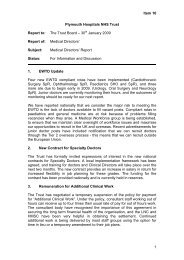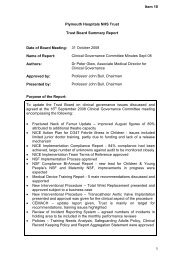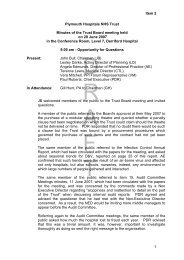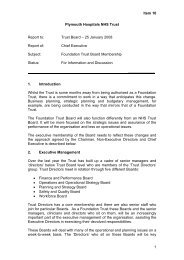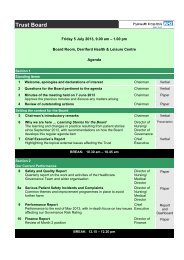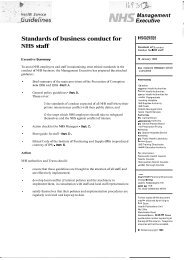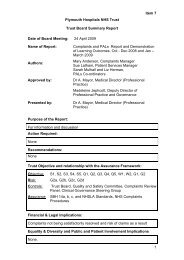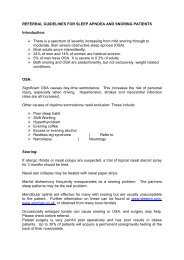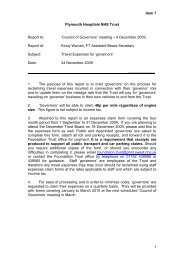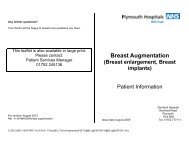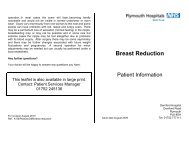Skin Cancer Service - Plymouth Hospitals
Skin Cancer Service - Plymouth Hospitals
Skin Cancer Service - Plymouth Hospitals
You also want an ePaper? Increase the reach of your titles
YUMPU automatically turns print PDFs into web optimized ePapers that Google loves.
Information<br />
for Patients<br />
<strong>Skin</strong> <strong>Cancer</strong> <strong>Service</strong><br />
<strong>Plymouth</strong> <strong>Hospitals</strong> NHS Trust<br />
Issue 08/09<br />
Review 08/11<br />
A-134/Onc/<strong>Skin</strong>/RD/Information for<br />
Patients<br />
Derriford Hospital<br />
Derriford Road<br />
<strong>Plymouth</strong><br />
PL6 8DH<br />
Tel: 0845 155 8155<br />
www.plymouthhospitals.nhs.uk
<strong>Plymouth</strong> Hospital NHS Trust<br />
Introduction<br />
Your Hospital Team<br />
<strong>Skin</strong> <strong>Cancer</strong> <strong>Service</strong><br />
This set of information leaflets is designed to provide you and<br />
your family with information about skin cancer and its treatment.<br />
At each stage of your treatment the relevant information will be<br />
added to your set.<br />
There are blank pages included for you to write down any<br />
questions you have. Any member of the skin cancer team will<br />
be happy to answer them for you either at your clinic<br />
appointment or over the telephone.<br />
There is a space for any member of the skin cancer team to<br />
write down comments or changes to your treatment so you have<br />
an up to date record of your planned care.<br />
We would appreciate any comments you have regarding this<br />
information and how beneficial it has been for you.<br />
Acknowledgement<br />
The authors would like to thank MARCS Line and the Wessex <strong>Cancer</strong><br />
Trust for reference materials used in the creation of this document.<br />
Introduction<br />
<strong>Skin</strong> <strong>Cancer</strong> <strong>Service</strong>
<strong>Plymouth</strong> Hospital NHS Trust<br />
Your personal details<br />
Your Hospital Team<br />
<strong>Skin</strong> <strong>Cancer</strong> <strong>Service</strong><br />
Name ………………………………………….…………...…………...............<br />
Telephone number ……………………………….……………..….................<br />
Address………………………………………………………………................<br />
……………………………………………….…………………………..............<br />
…………………………………………………………………………...............<br />
…………………………………………………………………………...............<br />
Date of birth ………...………………………………………………................<br />
Your GP’s name and address ………...…………………………..................<br />
…………………………………………………………………………...............<br />
GP’s telephone number ……………………………………………................<br />
Consultant’s name ………………………………………………….................<br />
Key Worker ………………………………………………………….................<br />
Your hospital number ……………………………………...……….................<br />
Hospital Address<br />
Derriford Hosptital,<br />
Derriford Road,<br />
<strong>Plymouth</strong><br />
DEVON, PL6 8DH.<br />
Tel: 08551558155<br />
Your Personal Details<br />
<strong>Skin</strong> <strong>Cancer</strong> <strong>Service</strong>
<strong>Plymouth</strong> Hospital NHS Trust<br />
<strong>Skin</strong> <strong>Cancer</strong> <strong>Service</strong><br />
The <strong>Skin</strong> <strong>Cancer</strong> Team at Derriford Hospital<br />
Your Hospital Team<br />
The <strong>Plymouth</strong> <strong>Skin</strong> <strong>Cancer</strong> Multidisciplinary Team (MDT) has a large team<br />
of specialists dedicated to providing first class care to patients with skin<br />
cancer. The team includes:<br />
Consultant Dermatologist<br />
Secretary number<br />
Dr Toby Chave (Lead Clinician MDT) 01752 763058<br />
Dr Jane Parrish (Associate Specialist) 01752 763058<br />
Dr Urzula Brudnik 01752 763057<br />
Appointments 01752 439936<br />
Consultant Plastic Surgeon<br />
Mr Duncan Mackenzie 01752 431519<br />
Mr Rob Morris 01752 431515<br />
Mr Anthony Fitton 01752 431515<br />
Mr David Camp 01752 431517<br />
Mr Lachlan Currie 01752 431516<br />
Mr Krish Kumar (Associate Specialist) 01752 431518<br />
Mr Jacob Manushakian 01752 431517<br />
Surgeon Commander Rory Rickard RN 01752 431515<br />
Appointments 01752 439937/431184<br />
Consultant Oncologist<br />
Dr Martin Highley 01752 763994<br />
<strong>Skin</strong> <strong>Cancer</strong> Nurse Specialist<br />
Ruth Devlin 01752 439800<br />
Consultant Histopathologist<br />
Dr Dean Harmse<br />
Consultant Radiologist<br />
Dr P Suresh<br />
Biopsy Nurse<br />
Diana Morgan<br />
The Team meet weekly, every Tuesday afternoon, to agree individual<br />
treatment plans. Following the meeting, you will be seen in the clinic by<br />
your Consultant where your treatment plan will be discussed with you and<br />
your family. A copy of the treatment plan will be sent to your GP.<br />
The <strong>Skin</strong> <strong>Cancer</strong> Team at Derriford Hospital<br />
<strong>Skin</strong> <strong>Cancer</strong> <strong>Service</strong>
<strong>Plymouth</strong> Hospital NHS Trust<br />
<strong>Skin</strong> <strong>Cancer</strong> <strong>Service</strong><br />
<strong>Skin</strong> <strong>Cancer</strong> Nursing <strong>Service</strong><br />
Ruth Devlin is our <strong>Skin</strong> <strong>Cancer</strong> Clinical Nurse Specialist. She is part of<br />
the multi-disciplinary team working towards improving the quality of care<br />
for people with skin cancer.<br />
As a Nurse Specialist, she is available to<br />
• help co-ordinate your care from diagnosis to treatment and through<br />
to follow up care<br />
• be a familiar face who can provide support for you and your family<br />
• provide information on tests, investigations and treatment options<br />
• offer support and advice on symptom control<br />
• provide a link to other professionals and support services<br />
Ruth can be contacted<br />
Monday – Friday<br />
9am – 5pm<br />
01752 439800<br />
e-mail: ruth.devlin@phnt.swest.nhs.uk<br />
Your Treatment Plan<br />
If you would like written details of your management plan please contact<br />
Ruth Devlin, <strong>Skin</strong> <strong>Cancer</strong> Nurse Specialist/Key worker on 01752 439800.<br />
Your Key Worker<br />
You will be offered a named Key Worker who will be responsible for<br />
co-ordinating your care. The whole team can be contacted via your key<br />
worker. To find out who your key worker is or for any other information<br />
about your care, please contact Ruth Devlin on 01752 439800.<br />
<strong>Skin</strong> <strong>Cancer</strong> Nursing <strong>Service</strong><br />
<strong>Skin</strong> <strong>Cancer</strong> <strong>Service</strong>
<strong>Plymouth</strong> Hospital NHS Trust<br />
<strong>Skin</strong> <strong>Cancer</strong> <strong>Service</strong><br />
Your Treatment Plan<br />
Your Hospital Team<br />
Your suggested treatment plan is<br />
_________________________________________________________<br />
_________________________________________________________<br />
_________________________________________________________<br />
_________________________________________________________<br />
_________________________________________________________<br />
_________________________________________________________<br />
_________________________________________________________<br />
_________________________________________________________<br />
_________________________________________________________<br />
_________________________________________________________<br />
_________________________________________________________<br />
_________________________________________________________<br />
_________________________________________________________<br />
_________________________________________________________<br />
_________________________________________________________<br />
_________________________________________________________<br />
Test results<br />
_________________________________________________________<br />
_________________________________________________________<br />
_________________________________________________________<br />
_________________________________________________________<br />
_________________________________________________________<br />
Your Treatment Plan<br />
<strong>Skin</strong> <strong>Cancer</strong> <strong>Service</strong>
<strong>Plymouth</strong> Hospital NHS Trust<br />
<strong>Skin</strong> <strong>Cancer</strong> <strong>Service</strong><br />
Malignant Melanoma<br />
Your Hospital Team<br />
What is a Malignant Melanoma?<br />
Malignant melanoma is the rarest, but the most serious of all<br />
skin cancers. There has been a sharp rise in numbers over the<br />
last decade and it accounts for around 7,000 new cases each<br />
year.<br />
It is a cancer of the melanocyte cells, which produce the brown<br />
pigmentation in your skin that forms freckles, moles, and your<br />
suntan. They are found at the base of the epidermis (the top<br />
layer of your skin).<br />
Malignant Melanomas appear in normal skin or in changing<br />
moles. Suspicious changes include an increase in size or<br />
change in shape, deepening in colour, itching, bleeding and<br />
surrounding inflammation. They can spread along the skin’s<br />
surface but they can also penetrate inwards into the deeper<br />
layers of the skin. This is when, if left untreated, they may<br />
spread to other areas of your body.<br />
If any of the melanoma cells have broken away they can spread<br />
to your lymph glands (also called nodes). You have lymph<br />
glands all over your body. There are large groups of them in<br />
your neck, jaw, axilla (armpit), elbow creases, groin and behind<br />
your knees. If the melanoma has spread it will generally travel<br />
to the nearest group of nodes from the original site and if this<br />
happens you will need to have all the glands in that area<br />
removed. This is known as a “block dissection”.<br />
Malignant Melanoma<br />
<strong>Skin</strong> <strong>Cancer</strong> <strong>Service</strong>
<strong>Plymouth</strong> Hospital NHS Trust<br />
<strong>Skin</strong> <strong>Cancer</strong> <strong>Service</strong><br />
Malignant Melanoma<br />
What are the causes?<br />
The cause of melanoma is not entirely understood but there is<br />
strong evidence to suggest that ultraviolet radiation caused by<br />
exposure to high intensity sunshine (causing the skin to burn) is<br />
a major factor. People with fair or red complexions are<br />
particularly at risk especially if they have been sunburnt during<br />
childhood and early adulthood. A small group of people may<br />
have a genetic predisposition to the development of melanoma<br />
and the use of sun beds is also thought to increase the risk of<br />
developing skin cancer.<br />
How are they treated?<br />
Treatment of malignant melanoma depends largely on the result<br />
of your biopsy, which usually involves close but complete<br />
surgical excision of the mole, and will tell us how thick your<br />
melanoma is (the Breslow thickness). You will be given the<br />
results of your tests approximately 4 weeks afterwards in the<br />
outpatients department.<br />
Following your biopsy you may need to have another operation<br />
called a “wide local excision” this is where a margin of healthy<br />
tissue is removed from around your biopsy scar. See additional<br />
leaflet on “wide local excision”.<br />
In some cases you will be asked to have other investigations to<br />
find out if there has already been any spread of your melanoma.<br />
Lentigo maligna (a form of malignant melanoma in situ) is not<br />
always treated with surgery because it has not penetrated into<br />
the deeper layer of skin it can sometimes be treated with<br />
radiotherapy or chemotherapy creams.<br />
Malignant Melanoma<br />
<strong>Skin</strong> <strong>Cancer</strong> <strong>Service</strong>
<strong>Plymouth</strong> Hospital NHS Trust<br />
Malignant Melanoma<br />
Your Hospital Team<br />
<strong>Skin</strong> <strong>Cancer</strong> <strong>Service</strong><br />
-<br />
Follow-Up Care<br />
You will initially need to be seen as an outpatient every 3 months<br />
for 3 years, this may then be continued on a 6 monthly basis for<br />
a further 2 years.<br />
At your follow-up appointments your melanoma site will be<br />
examined for signs of recurrence and your lymph glands will be<br />
examined for signs of enlargement. You will be shown what to<br />
look for in your melanoma site and how to examine your own<br />
lymph glands by your Consultant and the Clinical Nurse<br />
Specialist. See additional leaflet on “how to check your lymph<br />
nodes”.<br />
Telephone numbers for follow-up appointments:<br />
Dermatology 01752 439936<br />
Plastic Surgery 01752 439937/431184<br />
Oncology 01752 763994<br />
Malignant Melanoma<br />
<strong>Skin</strong> <strong>Cancer</strong> <strong>Service</strong>
<strong>Plymouth</strong> Hospital NHS Trust<br />
<strong>Skin</strong> <strong>Cancer</strong> <strong>Service</strong><br />
Wide Local Excision<br />
The aim of this surgery is to remove an area of healthy tissue<br />
from around the site of the melanoma and therefore minimise<br />
the risk of the cancer returning to that area. You will already<br />
have a scar from where you had your mole/lesion removed, and<br />
as we need to take away more skin you will end up with a<br />
slightly longer scar. The wound itself will be closed with stitches<br />
and tape over the top to reinforce the wound. The stitches (if<br />
they are not dissolvable) will need to be removed 7–14 days<br />
post surgery.<br />
In some cases there will not be enough skin to close the wound<br />
directly, in which case you may need to have a skin graft, but<br />
your doctor will discuss this with you beforehand.<br />
Following your procedure your doctor will advise you on care of<br />
the wound.<br />
Possible post operative problems<br />
Pain – You may experience some mild discomfort following<br />
surgery. This can easily be controlled with mild pain killers.<br />
You will be given a supply before you leave hospital.<br />
Bruising and haematoma – You may experience some<br />
bruising. This will gradually disappear, but occasionally blood<br />
collects within the tissues surrounding the wound causing<br />
swelling, discomfort and hardness. This is called a haematoma.<br />
Although the blood will eventually be reabsorbed by the body,<br />
this can take a few weeks. If the haematoma causes you a lot of<br />
discomfort, you should contact:<br />
• Your GP<br />
• Dermatology Department on 763053<br />
• Plastic Surgery Dressing Clinic on 01752 431024<br />
Wide Local Excision<br />
<strong>Skin</strong> <strong>Cancer</strong> <strong>Service</strong>
<strong>Plymouth</strong> Hospital NHS Trust<br />
<strong>Skin</strong> <strong>Cancer</strong> <strong>Service</strong><br />
Infection – If your wound becomes red, inflamed, more painful<br />
or begins to ooze you may need a course of antibiotics, so you<br />
will need to contact:<br />
• Your GP<br />
• Dermatology Department on 01752 763053<br />
• Plastic Surgery Dressing Clinic on 01752 431024<br />
Movement – Depending on where your wound is you may need<br />
to be careful when moving/lifting but you will be told this before<br />
you leave hospital.<br />
Follow-Up Appointment<br />
You will need to have a wound check following surgery. This is<br />
to check that there are no problems and that your wound is<br />
healing well. This may be done at your G.P.’s surgery by the<br />
practice nurse (you will need to make an appointment).<br />
Following this you may need to come back to the hospital<br />
outpatient department for follow-up. (See previous paragraph on<br />
follow-up care).<br />
Wide Local Excision<br />
<strong>Skin</strong> <strong>Cancer</strong> <strong>Service</strong>
<strong>Plymouth</strong> Hospital NHS Trust<br />
<strong>Skin</strong> <strong>Cancer</strong> <strong>Service</strong><br />
How to Check Your Lymph Nodes<br />
Your Hospital Team<br />
Introduction<br />
You have been diagnosed with a skin cancer that on occasions<br />
can spread into the lymphatic system. That is why, as part of<br />
your examination, your nodes are examined by your doctor or<br />
specialist nurse at your follow-up appointments. The lymph<br />
nodes examined depend on the location of your skin cancer,<br />
eg: if your skin cancer was on your leg then the lymph nodes in<br />
your inguinal area (groin) will be felt or if on your face then the<br />
nodes in your head and neck would be examined. The aim is to<br />
detect any enlargement of the lymph nodes and undertake<br />
investigations at an early stage. Some people express a wish to<br />
check their own lymph nodes between clinic appointments. This<br />
is why you have been given this information. Your doctor or<br />
nurse will show you how and which lymph nodes to check.<br />
The Lymphatic System<br />
This system consists of<br />
lymphatic vessels and<br />
tissue. Lymph is a fluid that<br />
contains proteins and waste<br />
materials, which is collected<br />
from around the cells in the<br />
body, eventually draining into<br />
larger vessels.<br />
Position of Lymph Nodes<br />
How to Check Your Lymph Nodes<br />
<strong>Skin</strong> <strong>Cancer</strong> <strong>Service</strong>
<strong>Plymouth</strong> Hospital NHS Trust<br />
<strong>Skin</strong> <strong>Cancer</strong> <strong>Service</strong><br />
Lymphatic vessels.<br />
One way of describing this is to imagine a river that starts as a<br />
small stream, which then weaves its way between the cells and<br />
small blood vessels of the body’s connective tissue. On its<br />
journey more tissue and waste material is collected. The fluid<br />
(lymph) that accumulates firstly drains into larger lymph vessels,<br />
then into ducts in the neck, before emptying into the blood<br />
stream.<br />
Lymphatic tissue.<br />
Lymph nodes are small oval clumps of lymphatic tissue found at<br />
intervals along the vessels. They are grouped like “beads on a<br />
string” both deep in the body and near the surface (see previous<br />
diagram). These lymph nodes filter out harmful organisms and<br />
cells from the lymphatic fluid before it is returned to the blood<br />
stream. Lymph nodes can only be felt in the areas listed:<br />
• head and neck<br />
• arms<br />
• axilla (armpits)<br />
• inguinal area (groin)<br />
• back of knees<br />
Usually lymph nodes are not enlarged and thus not able to be<br />
felt, but if you have previously had an infection (such as<br />
tonsillitis) you may have noticed and felt lymph nodes becoming<br />
enlarged, painful and tender. Lymph nodes can also become<br />
enlarged due to cancer cells lodging in them.<br />
Checking your lymph nodes once a month is sufficient and this<br />
can be done at the same time as you check your skin for any<br />
changing moles. Checking them more often may result<br />
indifficulty noticing any change.<br />
Do not panic if you feel a lymph node as it may well be due to an<br />
infection, but if it has not gone away in a week contact your<br />
doctor or specialist nurse.<br />
How to Check Your Lymph Nodes<br />
<strong>Skin</strong> <strong>Cancer</strong> <strong>Service</strong>
<strong>Plymouth</strong> Hospital NHS Trust<br />
<strong>Skin</strong> <strong>Cancer</strong> <strong>Service</strong><br />
How to Check Lymph Nodes in the Head<br />
and Neck<br />
Your Hospital Team<br />
• With your fingertips, in a gentle circular motion feel the lymph<br />
nodes shown.<br />
• Start with the nodes in front of the ear (1) then follow in order<br />
finishing just above the collar bone (10)<br />
• Always check your nodes in this order.<br />
• Check both sides for comparison. If you have an enlarged<br />
lymph node it may feel like a swelling the size of a pea,<br />
sometimes they can be larger.<br />
When feeling the nodes in your neck (marked 8):<br />
• Tilt your head towards the side you are examining, this helps<br />
to relax the muscle.<br />
• Now press your fingers under the muscle.<br />
When checking the lymph nodes above the collar bone:<br />
• Hunch your shoulders and bring your elbows forward to relax<br />
the skin.<br />
• Now feel above the collar bone (marked 10).<br />
How to Check Lymph Nodes in the Head and Neck<br />
<strong>Skin</strong> <strong>Cancer</strong> <strong>Service</strong>
<strong>Plymouth</strong> Hospital NHS Trust<br />
<strong>Skin</strong> <strong>Cancer</strong> <strong>Service</strong><br />
How to Check Lymph Nodes in the Armpit<br />
Your Hospital Team<br />
Remove all clothing down to the waist to get easy access<br />
to the armpits.<br />
• Sit in a comfortable position.<br />
• Check each armpit in turn.<br />
To check the left side, lift your arm slightly then place the fingers<br />
of your right hand high into the armpit and then lower your arm.<br />
• Feel in the central area of the armpit.<br />
Now move your fingers firmly against the chest wall as<br />
follows:<br />
• Along the front border of the armpit.<br />
• Along the back border of the armpit.<br />
• Feel along the inner border of the arm.<br />
Now check the other armpit.<br />
How to Check Lymph Nodes in The Armpit<br />
<strong>Skin</strong> <strong>Cancer</strong> <strong>Service</strong>
<strong>Plymouth</strong> Hospital NHS Trust<br />
<strong>Skin</strong> <strong>Cancer</strong> <strong>Service</strong><br />
How to Check Lymph Nodes in the Groin<br />
Your Hospital Team<br />
There are two areas to look for inguinal (groin) nodes:<br />
• Feel the horizontal chain of nodes in the right groin just<br />
below the ligament (see above diagram).<br />
• Feel the vertical chain along the upper thigh (see above<br />
diagram).<br />
• Check the lymph nodes in the other groin.<br />
Conclusion<br />
The purpose of this information is to help you understand why<br />
you have your nodes checked at your follow-up appointments.<br />
It explains which lymph nodes you need to check and how to<br />
undertake this procedure yourself. The aim is to ensure that if in<br />
the unlikely case there is spread of your skin cancer to the<br />
lymph nodes, it is detected and reported to your doctor or nurse<br />
straight away rather than waiting until your next clinic<br />
appointment.<br />
How to Check Lymph Nodes in the Groin<br />
<strong>Skin</strong> <strong>Cancer</strong> <strong>Service</strong>
<strong>Plymouth</strong> Hospital NHS Trust<br />
<strong>Skin</strong> <strong>Cancer</strong> <strong>Service</strong><br />
Pre-operative Assessment<br />
What is pre-operative assessment and why do I<br />
have to have it?<br />
Pre-operative assessment is an outpatient clinic you will be<br />
asked to attend prior to your surgery. It will be on Marlborough<br />
Ward, Level 10 at Derriford Hospital.<br />
Assessing you before your operation allows us to:<br />
• determine your fitness for the forthcoming anaesthetic<br />
• give you information about your operation and answer any<br />
questions you may have<br />
• prepare you for your operation and plan your discharge<br />
You will be seen one to two weeks before your operation<br />
How long will it take?<br />
Assessment itself usually takes about 45 minutes, but you will<br />
need to allow time for any tests to be carried out. Please allow<br />
two hours in total.<br />
How will I be assessed?<br />
Pre-assessment is a very individual process where a specially<br />
trained nurse will assess you. It may also be necessary for you<br />
to see<br />
• A consultant or doctor<br />
• An anaesthetist<br />
What does the assessment involve?<br />
The assessment will involve checking:<br />
• any previous medical / surgical history<br />
• whether you have any current medical problems<br />
• any medications you take<br />
• how you will manage at home with personal hygiene and<br />
domestic chores<br />
Pre-operative Assesment<br />
<strong>Skin</strong> <strong>Cancer</strong> <strong>Service</strong>
<strong>Plymouth</strong> Hospital NHS Trust<br />
• what help and support you have, e.g. with cooking,<br />
shopping, care of young children<br />
<strong>Skin</strong> <strong>Cancer</strong> <strong>Service</strong><br />
We will give you information about:<br />
• the operation itself<br />
• how long you can expect to be in hospital<br />
• what to expect after the operation and your discharge<br />
from hospital<br />
• some of the risks involved<br />
• we will want to weigh you, record your blood pressure and<br />
pulse<br />
We may also want to carry out other investigations, including:<br />
• blood tests<br />
• ECG (tracing of heart activity)<br />
• MRSA screening<br />
What do I need to bring?<br />
You need to bring any medication you are taking<br />
What happens if you feel unwell or we find<br />
something wrong?<br />
Simple problems can often be treated by your GP before you are<br />
due to come into hospital, this will allow the operation to go<br />
ahead as planned. However, complicated problems are<br />
sometimes more difficult to solve; your consultant or anaesthetist<br />
may postpone your operation temporarily to allow time for further<br />
tests or treatment. This is to ensure you are as fit as possible for<br />
your operation. If this happens you will be given a new<br />
admission date as soon as possible.<br />
If you have any problems / queries please<br />
do not hesitate to contact Marlborough Ward<br />
Tel: 0845 155 8133<br />
Pre-operative Assesment<br />
<strong>Skin</strong> <strong>Cancer</strong> <strong>Service</strong>
<strong>Plymouth</strong> Hospital NHS Trust<br />
<strong>Skin</strong> Grafts for <strong>Skin</strong> <strong>Cancer</strong><br />
<strong>Skin</strong> <strong>Cancer</strong> <strong>Service</strong><br />
Your Hospital Team<br />
Surgery for skin cancer involves removing the affected area and<br />
some of the surrounding, healthy-looking skin. If the area is<br />
fairly small, it will be possible to close the wound by bringing the<br />
edges of the skin together. Larger wounds may need a skin graft<br />
to cover the area.<br />
<strong>Skin</strong> grafts are layers of skin taken from another part of the body<br />
(see the ‘donor site’ leaflet) and placed over the area where the<br />
cancer has been removed. A partial thickness (or split thickness)<br />
skin graft is where the epidermis and a part of the dermis layer is<br />
used. The skin is usually taken from the thigh, buttock or upper<br />
arm. <strong>Skin</strong> will grow back in this area.<br />
A full thickness skin graft is where the epidermis and the full<br />
dermis layers are used. In this case, only a small area is taken<br />
from the donor site and the skin edges of the donor site are then<br />
stitched together to heal. <strong>Skin</strong> may be taken from the neck, the<br />
area behind the ears and the inner side of the upper arm.<br />
How is a skin graft applied?<br />
You may have either a general or a local anaesthetic depending<br />
on the area being grafted. Your doctor will advise you which is<br />
best for you. Once the skin layer has been taken from the donor<br />
site, it is placed over the wound where the cancer has been<br />
removed. The graft may be stapled, stitched or glued in place,<br />
or simply laid onto the area. These techniques depend on the<br />
patient, the size of the skin graft and the area where it is applied,<br />
or on the Consultant’s instructions.<br />
What happens after the surgery?<br />
You will need to take things gently for the first two weeks to allow<br />
the graft to heal properly. The grafted area is quite fragile, so it<br />
is important not to rub or brush against the graft or the dressing,<br />
<strong>Skin</strong> Grafts for <strong>Skin</strong> <strong>Cancer</strong><br />
<strong>Skin</strong> <strong>Cancer</strong> <strong>Service</strong>
<strong>Plymouth</strong> Hospital NHS Trust<br />
<strong>Skin</strong> <strong>Cancer</strong> <strong>Service</strong><br />
or put any pressure on the area. If it is anywhere other than on<br />
your leg(s), you can start walking as soon as you feel up to it.<br />
If it is on one or both of your legs, then we encourage limited<br />
mobility for usually for 2 days, or until the skin graft is secure<br />
enough for walking. This means you can transfer from bed to<br />
chair only and avoiding putting any weight through the grafted<br />
leg. The nursing staff will advise you when you can start to walk.<br />
If the grafted area is on your hand you may have a sling to keep<br />
your arm raised as much as possible.<br />
What dressing will be used?<br />
Both the graft and donor site will be covered by a dressing. The<br />
dressing applied to the graft is important as it helps to immobilise<br />
the grafted area, which will encourage the graft to take.<br />
Will I need to keep it dressed when I go home?<br />
Yes, in the early days a protective dressing will be necessary.<br />
This will be changed by either the plastic surgery dressing clinic<br />
at the hospital, the district nurse or by your GP practice nurse if<br />
you can attend there.<br />
How can I help my skin graft to take?<br />
By eating a healthy balanced diet with plenty of protein such as<br />
milk, meat, cheese, yoghurt, eggs and fish. Avoiding smoking<br />
also helps as smoking slows down the healing process by<br />
reducing the oxygen and blood supply to the grafted area.<br />
What will my skin graft look like?<br />
With any skin graft, scar formation is inevitable. The appearance<br />
of your skin graft will change considerably over the weeks and<br />
months to follow, so its initial appearance should not cause<br />
alarm. It can take up to 18 months for a scar to “mature”, usually<br />
leaving a pale, soft, flat and supple surface.<br />
<strong>Skin</strong> Grafts for <strong>Skin</strong> <strong>Cancer</strong><br />
<strong>Skin</strong> <strong>Cancer</strong> <strong>Service</strong>
<strong>Plymouth</strong> Hospital NHS Trust<br />
<strong>Skin</strong> <strong>Cancer</strong> <strong>Service</strong><br />
How do I care for the skin graft once it has healed?<br />
<strong>Skin</strong> grafts have fewer oil and sweat glands so tend to become<br />
dry. When the graft is completely healed, it should be kept clean<br />
by gentle washing. Avoid very hot water and never use highly<br />
perfumed soaps, creams or bubble baths until it is well healed.<br />
You need to gently massage oily cream in once or twice a day to<br />
moisturise the graft and keep the skin supple. E45, aqueous<br />
cream or unperfumed Nivea can be used. This is usually kept<br />
up for 6 months.<br />
Will I need to wear any support when I go home?<br />
If your skin graft is on your leg, yes you will. Tubigrip (an elastic<br />
stocking) is required for walking for several months after and<br />
should not be discontinued without medical advice. Tubigrip<br />
should be applied in the morning and removed when you go to<br />
bed. Your leg(s) should be elevated on a stool when you are<br />
resting to prevent any unnecessary swelling.<br />
Is there any other advice I should know about<br />
caring for my skin graft?<br />
Yes, the skin graft will be very sensitive to the sun. The graft<br />
may sunburn more readily or develop blotchy pigmentation. For<br />
the first year during strong sunshine, your graft should be<br />
protected. Keep it covered up or use total block cream that you<br />
can buy from your local chemist.<br />
If you experience any problems immediately after your<br />
discharge from hospital, you can telephone Lynher Ward<br />
anytime on 01752 7922744 for advice. If you experience any<br />
problems once you are under the care of the dressing clinic,<br />
please contact them on 01752 431024 (Monday-Friday, 0830-<br />
1630).<br />
<strong>Skin</strong> Grafts for <strong>Skin</strong> <strong>Cancer</strong><br />
<strong>Skin</strong> <strong>Cancer</strong> <strong>Service</strong>
<strong>Plymouth</strong> Hospital NHS Trust<br />
<strong>Skin</strong> <strong>Cancer</strong> <strong>Service</strong><br />
Donor Sites<br />
What is a donor site?<br />
A donor site is the area left where a piece of skin has been taken<br />
to cover a wound on another part of the body. There are various<br />
areas from which skin can be taken, such as the thigh, the upper<br />
arm, or even the buttocks.<br />
How long will it take for the donor site to heal?<br />
It usually takes around 10-14 days. The dressing applied in<br />
theatre at the time of your operation will stay in place for that<br />
period and should be kept clean and dry. A donor site is like a<br />
bad graze, so the dressing protects the raw surface and allows it<br />
to heal, and also soaks up any fluid that naturally seeps from the<br />
wound. This can sometimes cause a strange odour, but this is<br />
normal.<br />
Will the dressing need to be changed before the<br />
10-14 day period?<br />
There are times when a donor area does need to be changed,<br />
such as if the dressing becomes loose, if there is an excessive<br />
loss of fluid through the dressing or if it becomes infected. This<br />
can be done by the hospital nurse if you are still in hospital, by<br />
the plastic surgery dressing clinic nurses or by your local<br />
practice nurse once you have been discharged.<br />
Will I get any pain from my donor site?<br />
Some people experience more pain than others, usually within<br />
the first 48 hours. Regular painkillers, such as paracetamol, can<br />
be taken.<br />
Donor Sites<br />
<strong>Skin</strong> <strong>Cancer</strong> <strong>Service</strong>
<strong>Plymouth</strong> Hospital NHS Trust<br />
<strong>Skin</strong> <strong>Cancer</strong> <strong>Service</strong><br />
Who will remove the dressing when it is due to<br />
come off?<br />
This will be done by the plastic surgery dressing clinic at the<br />
hospital, the district nurse or by your GP practice nurse if you<br />
can attend there. This will be arranged by the ward staff when<br />
you are discharged. The dressing usually loosens itself as the<br />
wound heals, otherwise it can be soaked off in the bath. If the<br />
area is fully healed and dry, then it can be left exposed and you<br />
can massage in cream, such as E45 or Nivea, twice a day.<br />
Do not apply it to raw areas.<br />
Do I have to be careful about what clothing I wear?<br />
Try not to wear articles of clothing that might make you itch or<br />
may be too tight. But if you find that some clothes do rub, a<br />
protective dry dressing should be worn.<br />
Will my donor site look like normal skin when it is<br />
healed?<br />
You can expect your donor site to change colour. At first it can<br />
look bright red, but over several months will become paler.<br />
Eventually it will blend in, but it may end up slightly paler than<br />
your surrounding skin. Be aware that, as with your skin graft,<br />
you should avoid strong sunlight, so you need to cover up or use<br />
total sun block. Advice should be taken from your doctor about<br />
lifting, stretching and returning to work.<br />
If you experience any problems immediately after your discharge<br />
from hospital, you can telephone Lynher Ward anytime on<br />
01752 7922744 for advice. If you experience any problems<br />
once you are under the care of the dressing clinic, please<br />
contact them on 01752 431024 (Monday-Friday, 0830-1630).<br />
Donor Sites<br />
<strong>Skin</strong> <strong>Cancer</strong> <strong>Service</strong>
<strong>Plymouth</strong> Hospital NHS Trust<br />
<strong>Skin</strong> <strong>Cancer</strong> <strong>Service</strong><br />
Squamous Cell Carcinoma (SCC)<br />
What is a squamous cell carcinoma?<br />
Squamous cell carcinoma is the second most common form of<br />
skin cancer. They are slow growing, red, scaly, irregular lesions<br />
that can bleed easily and fail to heal within 4-6 weeks. If left<br />
untreated they can spread to other parts of the body.<br />
What are the causes?<br />
Prolonged exposure to sunlight is the cause of almost all<br />
squamous cell carcinomas. They occur most frequently on<br />
exposed parts of the body such as the face, ears, neck, scalp,<br />
shoulders and back. Rarely, SCCs can develop on non-exposed<br />
areas of the body. Anyone with a history of frequent sun<br />
exposure and repeated sunburn are high risk and also people<br />
who have fair skin, light hair, and blue, green, or grey eyes.<br />
How are they treated?<br />
Squamous cell carcinoma can be treated by minor surgery under<br />
a local or general anaesthetic. Treatment depends on the size<br />
and position of the SCC and can involve:-<br />
Currettage:<br />
For very small SCCs this is a very effective treatment. Under a<br />
local anaesthetic your doctor can simply scrape the lesion away<br />
from your skin. This might leave a small scar.<br />
Surgery:<br />
Most SCCs can be cut out and this is often the best treatment.<br />
This allows the tissue to be tested by a pathologist to confirm the<br />
diagnosis and check that it has been completely removed.<br />
Occasionally excision is not complete or the margin is narrow<br />
necessitating further treatment. Cutting the SCC out means that<br />
Sqaumous Cell Carcinoma<br />
<strong>Skin</strong> <strong>Cancer</strong> <strong>Service</strong>
<strong>Plymouth</strong> Hospital NHS Trust<br />
<strong>Skin</strong> <strong>Cancer</strong> <strong>Service</strong><br />
the hole left behind may require a skin graft (see leaflet on “skin<br />
grafts”).<br />
SCCs that are large (greater than 2cm in diameter) or thick,<br />
have a higher risk of spreading to other parts of the body. If the<br />
SCC spreads to the local lymph glands (there may be a lump in<br />
the groin, armpit or neck) then surgical removal of all the glands<br />
in that area will be required. See leaflet “how to check your<br />
lymph nodes”.<br />
Radiotherapy:<br />
Treating SCCs with a very short and localised course of<br />
radiotherapy has been shown to be as effective in curing SCCs.<br />
In some patients this may be the best option.<br />
Follow up<br />
Patients with small, low risk SCCs may be discharged back to<br />
their GP after removal.<br />
Patients with more aggressive tumours are followed up regularly<br />
every 3-6 months in out patients for up to five years. Your doctor<br />
will decide how often your follow up will be.<br />
Telephone numbers for follow-up appointments:<br />
Dermatology 01752 439936<br />
Plastic Surgery 01752 439937/431184<br />
Oncology 01752 763994<br />
Sqaumous Cell Carcinoma<br />
<strong>Skin</strong> <strong>Cancer</strong> <strong>Service</strong>
<strong>Plymouth</strong> Hospital NHS Trust<br />
<strong>Skin</strong> <strong>Cancer</strong> <strong>Service</strong><br />
Contact Details<br />
Some contacts that you may find useful:<br />
• Macmillan <strong>Cancer</strong> Support – contact cancer nurses for<br />
support and information, produce an extensive range of<br />
booklets and fact sheets on all aspects of cancer, available<br />
free to patients.<br />
Telephone 0808 808 0000 or www.macmillan.org.uk<br />
• Macmillan <strong>Cancer</strong> Support Fund – is a UK-wide charity<br />
which supports people living with cancer. Macmillan<br />
cancer relief will provide grants for people with cancer in<br />
financial need. Your skin cancer specialist nurse can apply for<br />
grants to the fund on your behalf.<br />
• Marcs Line – a resource centre for melanoma and related<br />
conditions and has a help line.<br />
Telephone 01722 415071 or marcsline@wessexcancer.org or<br />
www.wessexcancer.org<br />
• <strong>Cancer</strong> Research UK – a national information service for<br />
all types of cancer.<br />
Telephone 0808 800 4040 or www.cancerhelp.org.uk and<br />
www.sunsmart.org.uk<br />
• Winston’s Wish – guidance and information for families of<br />
bereaved children, supporting bereaved children and young<br />
people.<br />
Telephone 0845 203 0405 or www.winstonswish.org.uk<br />
• Benefit Enquiry Line – for help and advice on claiming<br />
benefit entitlements.<br />
Telephone 0800 882200<br />
Contact Details<br />
<strong>Skin</strong> <strong>Cancer</strong> <strong>Service</strong>
<strong>Plymouth</strong> Hospital NHS Trust<br />
<strong>Skin</strong> <strong>Cancer</strong> <strong>Service</strong><br />
Contact Details<br />
• Citizens Advice Bureau –Your phone book will have the<br />
number for your local office.<br />
• Southwest Public Health Observatory<br />
www.swpho.nhs.uk<br />
• The Mustard Tree Macmillan Centre<br />
Offer people affected by cancer access to good quality,<br />
comprehensive and appropriate information and support.<br />
The Centre is based on Level 3, Derriford Hospital.<br />
Opening times are Monday to Friday (except Bank Holidays).<br />
Drop in or telephone on 01752 763672.<br />
• The Triangle Centres<br />
For cancer support and information for patients, their families<br />
and carers. The Centres, staffed by professionals and trained<br />
volunteers, provide a friendly and welcoming environment<br />
where you can share your concerns, ask questions and<br />
receive support and information.<br />
Devonport, Cumberland Centre<br />
Mondays 1.45pm - 5.50pm<br />
Telephone 08451558002<br />
Kingsbridge, South Hams Hospital<br />
Tuesday 9.30am - 4.40pm<br />
Telephone 01548 852349<br />
Liskeard, Liskeard Community Hospital<br />
Thursday 9.30am - 4.30pm<br />
Telephone 01579 335600 Ext. 5628<br />
Tavistock, Tavistock Clinic<br />
Fridays 9.15am - 4.15pm<br />
Telephone 01822 615935<br />
Contact Details<br />
<strong>Skin</strong> <strong>Cancer</strong> <strong>Service</strong>
<strong>Plymouth</strong> Hospital NHS Trust<br />
<strong>Skin</strong> <strong>Cancer</strong> <strong>Service</strong><br />
Help with Finance<br />
Your Hospital Team<br />
Help with travel costs for patients<br />
Patients in receipt of the following can claim for help with travel<br />
expenses:<br />
• Pension credit (guaranteed credit)<br />
• Income support<br />
• Income based job seekers allowance<br />
• Working tax credit in certain cases<br />
• Child tax credit in certain cases<br />
• Patients on a low income who have been issued with a<br />
HC2 or HC3 form<br />
• Patients who are on a low income but are unable to<br />
produce the above should complete a HC1 or HC5 form<br />
and send it to the health benefits division in the envelope<br />
provided with the form<br />
• War pensions (claim direct from War Office)<br />
• Asylum Seekers<br />
Help with travel costs for carers<br />
Carers can claim back travel cost from the DWP social fund if<br />
the patient is in receipt of:<br />
• Pension credit<br />
• Income support<br />
• Income based job seeker allowance<br />
Other Funding for travel costs<br />
You may be eligible for assistance via other charitable funding<br />
such as Macmillan grants or local cancer charities. You can<br />
speak to our benefits advisor to check your entitlement.<br />
Help with Finance<br />
<strong>Skin</strong> <strong>Cancer</strong> <strong>Service</strong>
<strong>Plymouth</strong> Hospital NHS Trust<br />
<strong>Skin</strong> <strong>Cancer</strong> <strong>Service</strong><br />
Help with Finance<br />
Your Hospital Team<br />
Full time benefits advisor<br />
We appreciate that during times of prolonged treatment a<br />
person’s financial position can alter radically. If you are not sure<br />
whether you are entitled to a benefit, or need help and advice,<br />
why not make a confidential appointment with our benefits<br />
advisor who is now full time within the Mustard Tree <strong>Cancer</strong><br />
Support Centre. She can help with:<br />
• Prescription charges<br />
• Work and cancer<br />
• General benefits for those who are sick or are caring<br />
• Travel costs for patients and their carers<br />
• Macmillan Grants<br />
• <strong>Plymouth</strong> and Cornwall <strong>Cancer</strong> Fund<br />
• Patient Voluntary Welfare Fund<br />
Please ring the Mustard Tree Macmillan Centre (01752) 763672<br />
to arrange an appointment.<br />
How do I find out more information?<br />
Advice and useful links can also be obtained from<br />
www.be.macmillan.org.uk or from the Macmillan helpline on<br />
freefone 0808 808 0000<br />
Help with Finance<br />
<strong>Skin</strong> <strong>Cancer</strong> <strong>Service</strong>
<strong>Plymouth</strong> Hospital NHS Trust<br />
Car Parking and Transport<br />
<strong>Skin</strong> <strong>Cancer</strong> <strong>Service</strong><br />
Public Transport<br />
Derriford Hospital is well served by buses from <strong>Plymouth</strong> and<br />
the surrounding area. For information on timetables and fares<br />
contact:<br />
http://www.traveline.org.uk<br />
Park and Ride<br />
Derriford is served well by public transport, hosting the second<br />
busiest bus terminal in <strong>Plymouth</strong> with 44 buses per hour calling<br />
at peak times.<br />
In addition, there is a public park and ride site located north of<br />
the hospital at the George junction (opposite the George<br />
Pub/Hotel). This is ideal for patients and visitors travelling from<br />
the north of the city to Derriford Hospital. It is open from 6.30am<br />
to 6.30pm and parking is free, although you will need to buy a<br />
ticket to travel on the bus (currently £1.50).<br />
Catch the First Bus no.7 service from the park and ride, which<br />
stops directly outside the main entrance to the hospital.<br />
The no.7 service leaves the park and ride every 30 minutes at<br />
24 minutes and 44 minutes past the hour.<br />
Car Parking and Transport<br />
<strong>Skin</strong> <strong>Cancer</strong> <strong>Service</strong>
<strong>Plymouth</strong> Hospital NHS Trust<br />
<strong>Skin</strong> <strong>Cancer</strong> <strong>Service</strong><br />
Walking and Cycling<br />
Walking or cycling to the hospital may be an option for you or<br />
visitors. Cycle parking is located by the main entrance. For a<br />
<strong>Plymouth</strong> cycle map contact <strong>Plymouth</strong> City Council on 304316 or<br />
pick one up from the hospital foyer.<br />
Taxis<br />
You can phone Taxifast free from the Derriford Hospital foyer on<br />
01752 222222. There are several other taxi providers, some of<br />
which are wheelchair accessible meaning patients can remain in<br />
their wheelchairs without transferring and drivers will convey<br />
patients direct to their appointments<br />
Drop-off bays<br />
Drop-off and collection bays are available around the hospital<br />
entrances.<br />
Transport Access for Patients (TAP)<br />
Priority is given to vulnerable people in isolated and rural areas.<br />
You may qualify for TAP if you:<br />
• Do not have or are unable for medical reasons to travel in<br />
your own transport<br />
• Cannot be driven to your healthcare appointment with friends,<br />
neighbours or relatives<br />
• Are medically unable to use public transport, or this is not<br />
practical due to your isolated/rural address AND without<br />
transport you will be unable to keep your hospital<br />
appointment.<br />
Please telephone TAP (Transport Access for Patients)<br />
On: 08450 539100<br />
Car Parking and Transport<br />
<strong>Skin</strong> <strong>Cancer</strong> <strong>Service</strong>
<strong>Plymouth</strong> Hospital NHS Trust<br />
<strong>Skin</strong> <strong>Cancer</strong> <strong>Service</strong><br />
Car parking charges<br />
There are several short-stay pay and display car parks for<br />
patients and visitors. Parking charges apply between 8am and<br />
9pm.<br />
Time<br />
Cost<br />
0-45 min Free (must obtain free ticket from pay and display<br />
45m-2hr £2.20<br />
2-3 hrs £3.30<br />
3-4 hrs £4.40<br />
4-6 hrs £6.60<br />
6-8 hrs £8.00<br />
No Charge between 21.00hrs – 07.00hrs<br />
There is a change machine at the main entrance on level 6.<br />
Concessions<br />
A range of concessionary tickets are available:<br />
• Patients attending clinics for Oncology, Chemotherapy or<br />
Radiotherapy.<br />
• Discounts are available for stays of a week or longer:<br />
£24 for a 5 day ticket (2 days free parking)<br />
£32 or a 7 day ticket (3 days free parking)<br />
£96 for a 1 month ticket (7 days free parking)<br />
All concessionary tickets can be shared between different<br />
vehicles<br />
Car Parking and Transport<br />
<strong>Skin</strong> <strong>Cancer</strong> <strong>Service</strong>
<strong>Plymouth</strong> Hospital NHS Trust<br />
<strong>Skin</strong> <strong>Cancer</strong> <strong>Service</strong><br />
For more information on these concessions please<br />
• ring 01752 763949<br />
• or go to the parking office in car park A. The parking office is<br />
open Monday – Friday 9am – 4pm; Saturday & Sunday<br />
3pm – 3.30pm and closed on Bank Holidays<br />
Free Parking<br />
The following groups are entitled to free parking:<br />
• All registered disabled patients who hold a disabled badge or<br />
drivers who are transporting a patient who holds a disabled<br />
badge<br />
• Relatives of those patients who are being cared for on the<br />
Liverpool End of Life Care Pathway (wards must ring to<br />
notify the parking office)<br />
Unexpected Stays<br />
If a patient’s stay is unexpectedly extended either due to clinics<br />
running late or unexpected admission to hospital, then please<br />
ask the ward/department to contact the parking office on 53949<br />
giving the patients car details and which car park they are parked<br />
in.<br />
Travel Expenses<br />
Some patients in receipt of certain state benefits may be entitled<br />
to a refund of their parking costs and travel expenses. Patients<br />
who are entitled to claim back their parking costs must collect a<br />
receipt from the parking office in car park A and take this receipt<br />
to the cashier’s office on level 7, Derriford Hospital or telephone<br />
0845 155 8170.<br />
Car Parking and Transport<br />
<strong>Skin</strong> <strong>Cancer</strong> <strong>Service</strong>
<strong>Plymouth</strong> Hospital NHS Trust<br />
Your Questions<br />
<strong>Skin</strong> <strong>Cancer</strong> <strong>Service</strong><br />
Your Questions<br />
<strong>Skin</strong> <strong>Cancer</strong> <strong>Service</strong>





